#taxes are unconstitutional
Text
💰🏦💰
#banks#the banking system is corrupt#lies#corruption#thefts#stealing from the people#bank robbers#loans#interests#taxes#taxes are illegal#taxes are unconstitutional#crimes against humanity#these people are evil#fight for justice#speaktruth#standup#speak up#truth#please share#wwg1wga
191 notes
·
View notes
Text
Paying taxes is unconstitutional... The End!
After hearing that 👆 video then you need to listen to this 👇 video again.
Think about doing some research. 🤔
#pay attention#educate yourselves#educate yourself#knowledge is power#reeducate yourself#reeducate yourselves#think about it#think for yourselves#think for yourself#do your homework#do some research#do your own research#ask yourself questions#question everything#taxes#unconstitutional#government corruption#government overreach#crimes against humanity#history lesson#american history#world history
386 notes
·
View notes
Text
The deed is done....
Hopefully I get approval by next Christmas to actually pick up the suppressor.
#tax stamp 2 is a go#yes yes fuck the ATF / the NFA is unconstitutional and all that jazz#But I like my dogs not shot so gotta do what i gotta do per the law for now
0 notes
Text
The Best News of Last Week - September 11, 2023
Sorry for not sending last week's issue as I got covid again :/ I passed it, so here's the best things that happened last week :)
1. The IRS plans to crack down on 1,600 millionaires to collect millions of dollars in back taxes

The IRS announced on Friday it is launching an effort to aggressively pursue 1,600 millionaires and 75 large business partnerships that owe hundreds of millions of dollars in past due taxes. The newly announced tax collection effort will begin as soon as October. “We have more hiring to do,” Werfel said. “It’s going to be a very busy fall for us.”
2. The NGO African Parks announced it would purchase the world’s largest population of privately owned white rhinos

Africa’s beleaguered rhinos have been thrown a significant lifeline with the announcement that nearly 2,000 semi-wild rhinos owned by South African rhino breeder John Hume will be “rewilded” into reserves across South Africa and other parts of the continent over the next 10 years.
3. Mexico supreme court decriminalizes abortion across country

Mexico’s supreme court has unanimously ruled that state laws prohibiting abortion are unconstitutional and violate women’s rights, in the latest in a series of victories for reproductive rights activists across Latin America.
Wednesday’s ruling came two years after the court ordered the northern state of Coahuila to remove sanctions for abortion from its criminal code, a decision which prompted a tortuous state-by-state process of legal battles. So far 12 of Mexico’s 31 states have decriminalized the procedure.
4. The first human organ created inside an animal opens the door to manufacturing ‘spare parts’ for people

It is a historic image. A team of researchers in China has successfully generated a blueprint of a human organ in another animal for the first time. The experiment, conducted with humanized kidneys in pig embryos, represents a step toward the still-distant dream of using other mammals as source of organs for transplants.
5. Study Shows a Single Dose of Psilocybin's Astonishing Impact on Depression and Could Change Medical Treatments of Mental Health Forever

Psychedelics are making a comeback, and this time, they're dressed in the respectable garb of clinical research. Recent studies have reignited interest in these substances, particularly psilocybin, the active compound in magic mushrooms, as a potent treatment for major depressive disorder (MDD).
6. Missing cat reunited with owner after it disappeared during Alaska flooding

Twenty-six days after he went missing, an adorable black and white cat named Leo has been reunited with his family. Brave Leo went missing after historic glacial flooding swept away his home and all his owner's belongings.
7. Dogs perform Mozart with orchestra in Denmark
youtube
A classical music festival in Copenhagen, Denmark, has opened with some canine additions to the orchestra.
---
That's it for this week :)
This newsletter will always be free. If you liked this post you can support me with a small kofi donation here:
Buy me a coffee ❤️
Also don’t forget to reblog this post with your friends.
684 notes
·
View notes
Text
“The donations are striking because American Compass is a partner organization in Project 2025, a controversial right-wing think tank that has been building the policy and personnel firmament for a second Trump administration.
Project 2025 is an arm of the Heritage Foundation and it has been criticized for its hard-right, authoritarian agenda—including “dehumanizing” rhetoric towards the LGBTQ community, re-upping Trump’s attempt to include citizenship on the census, leveraging the power of the Justice Department to crack down on critics, and a potentially unconstitutional plan to sic U.S. troops on domestic protesters.”
Many oligarchs and corporations have tried to mask their right-wing connections with small donations to left leaning institutions like NPR.
The Walton family oligarchs in particular (Walmart/Sams Cub) began scrubbing the internet and hiding their right-wing ties following calls for boycotts. This began during the two terms of Republican warmongers Bush/Cheney. Walmart is particularly susceptible to boycott because they lack the diversification of other oligarchs like the Koch family. But in fact they donate to Project 2025 and other high profile right-wing initiatives that we progressives protest against.
*As a side note many still refer to the Koch brothers but this is inaccurate as one died during the Trump years and is now rotting in Hell. Other members of the family hold power and run various programs and initiatives with the Republicans.
#Walmart supports Project 2025#republican assholes#traitor trump#crooked donald#project 2025#dark money#vast right wing conspiracy#American Compass
169 notes
·
View notes
Photo

Some highlights from the proposed bill for those interested:
Highest Personal Income Tax Rate Since 1986 (combined Federal Tax rate of 45%)
Highest Capital Gains Tax Since 1978. A rate over twice as high as China’s capital gains tax rate.(nearly doubles rate from 20% to 39%)
Corporate Tax Rate Higher than Communist China. (A 31% increase, from 21% to 28%)
Unconstitutional Wealth Tax on Unrealized Gains
Quadrupled Tax on Stock Buybacks. This tax will hit every American with a 401K or IRA or union pension.
$31 Billion Tax on American Energy
32% Increase to Medicare Taxes
Carried Interest Tax on Capital Gains
$23 Billion Retirement Tax
$24 Billion Cryptocurrency Tax
Real Estate Tax Hike (wants to end 1031 Like-Kind Exchanges)
Doubles the Global Minimum Tax (Global Intangible Low-Tax Income (GILTI) from on U.S. multinational corporations from 10.5 to 21 percent, which after the disallowance of foreign tax credits would provide a top rate of 26.25 percent)
#Capitalism#Socialism#Politics#Anticapitalism#Antisocialism#Wage#Wage Gap#Eat the Rich#Minimum Wage#Living Wage#Affordable Education#Affordable Healthcare#Free Education#Free Healthcare#Student Loans#Accounting#Consulting#Business#Humor#Funny#Funny meme#Funny memes#Dark Humor#Office Humor#Excel#Economics#Keynesian Economics#Austrian Economics#Finance
522 notes
·
View notes
Text
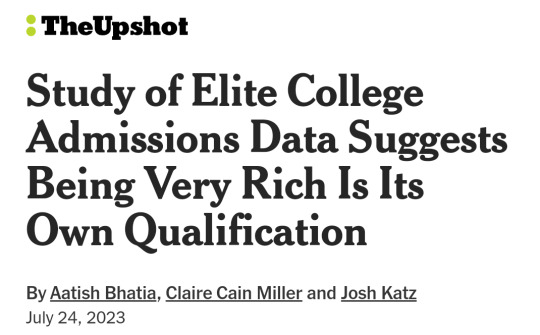


Study of Elite College Admissions Data Suggests Being Very Rich Is Its Own Qualification
By Aatish Bhatia, Claire Cain Miller and Josh Katz July 24, 2023 (full text under the cut)
Elite colleges have long been filled with the children of the richest families: At Ivy League schools, one in six students has parents in the top 1 percent.

A large new study, released Monday, shows that it has not been because these children had more impressive grades on average or took harder classes. They tended to have higher SAT scores and finely honed résumés, and applied at a higher rate — but they were overrepresented even after accounting for those things. For applicants with the same SAT or ACT score, children from families in the top 1 percent were 34 percent more likely to be admitted than the average applicant, and those from the top 0.1 percent were more than twice as likely to get in.
The study — by Opportunity Insights, a group of economists based at Harvard who study inequality — quantifies for the first time the extent to which being very rich is its own qualification in selective college admissions.
The analysis is based on federal records of college attendance and parental income taxes for nearly all college students from 1999 to 2015, and standardized test scores from 2001 to 2015. It focuses on the eight Ivy League universities, as well as Stanford, Duke, M.I.T. and the University of Chicago. It adds an extraordinary new data set: the detailed, anonymized internal admissions assessments of at least three of the 12 colleges, covering half a million applicants. (The researchers did not name the colleges that shared data or specify how many did because they promised them anonymity.)
The new data shows that among students with the same test scores, the colleges gave preference to the children of alumni and to recruited athletes, and gave children from private schools higher nonacademic ratings. The result is the clearest picture yet of how America’s elite colleges perpetuate the intergenerational transfer of wealth and opportunity.
“What I conclude from this study is the Ivy League doesn’t have low-income students because it doesn’t want low-income students,” said Susan Dynarski, an economist at the Harvard Graduate School of Education, who has reviewed the data and was not involved in the study.
In effect, the study shows, these policies amounted to affirmative action for the children of the 1 percent, whose parents earn more than $611,000 a year. It comes as colleges are being forced to rethink their admissions processes after the Supreme Court ruling that race-based affirmative action is unconstitutional.
“Are these highly selective private colleges in America taking kids from very high-income, influential families and basically channeling them to remain at the top in the next generation?” said Raj Chetty, an economist at Harvard who directs Opportunity Insights, and an author of the paper with John N. Friedman of Brown and David J. Deming of Harvard. “Flipping that question on its head, could we potentially diversify who’s in a position of leadership in our society by changing who is admitted?”
Representatives from several of the colleges said that income diversity was an urgent priority, and that they had taken significant steps since 2015, when the data in the study ends, to admit lower-income and first-generation students. These include making tuition free for families earning under a certain amount; giving only grants, not loans, in financial aid; and actively recruiting students from disadvantaged high schools.
“We believe that talent exists in every sector of the American income distribution,” said Christopher L. Eisgruber, the president of Princeton. “I am proud of what we have done to increase socioeconomic diversity at Princeton, but I also believe that we need to do more — and we will do more.”
Affirmative action for the rich
In a concurring opinion in the affirmative action case, Justice Neil Gorsuch addressed the practice of favoring the children of alumni and donors, which is also the subject of a new case. “While race-neutral on their face, too, these preferences undoubtedly benefit white and wealthy applicants the most,” he wrote.
The new paper did not include admissions rates by race because previous research had done so, the researchers said. They found that racial differences were not driving the results. When looking only at applicants of one race, for example, those from the highest-income families still had an advantage. Yet the top 1 percent is overwhelmingly white. Some analysts have proposed diversifying by class as a way to achieve more racial diversity without affirmative action.
The new data showed that other selective private colleges, like Northwestern, N.Y.U. and Notre Dame, had a similarly disproportionate share of children from rich families. Public flagship universities were much more equitable. At places like the University of Texas at Austin and the University of Virginia, applicants with high-income parents were no more likely to be admitted than lower-income applicants with comparable scores.
Less than 1 percent of American college students attend the 12 elite colleges. But the group plays an outsize role in American society: 12 percent of Fortune 500 chief executives and a quarter of U.S. senators attended. So did 13 percent of the top 0.1 percent of earners. The focus on these colleges is warranted, the researchers say, because they provide paths to power and influence — and diversifying who attends has the potential to change who makes decisions in America.
The researchers did a novel analysis to measure whether attending one of these colleges causes success later in life. They compared students who were wait-listed and got in, with those who didn’t and attended another college instead. Consistent with previous research, they found that attending an Ivy instead of one of the top nine public flagships did not meaningfully increase graduates’ income, on average. However, it did increase a student’s predicted chance of earning in the top 1 percent to 19 percent, from 12 percent.
For outcomes other than earnings, the effect was even larger — it nearly doubled the estimated chance of attending a top graduate school, and tripled the estimated chance of working at firms that are considered prestigious, like national news organizations and research hospitals.
“Sure, it’s a tiny slice of schools,” said Professor Dynarski, who has studied college admissions and worked with the University of Michigan on increasing the attendance of low-income students, and has occasionally contributed to The New York Times. “But having representation is important, and this shows how much of a difference the Ivies make: The political elite, the economic elite, the intellectual elite are coming out of these schools.”
The missing middle class
The advantage to rich applicants varied by college, the study found: At Dartmouth, students from the top 0.1 percent were five times as likely to attend as the average applicant with the same test score, while at M.I.T. they were no more likely to attend. (The fact that children from higher-income families tend to have higher standardized test scores and are likelier to receive private coaching suggests that the study may actually underestimate their admissions advantage.)
An applicant with a high test score from a family earning less than $68,000 a year was also likelier than the average applicant to get in, though there were fewer applicants like this.
Children from middle- and upper-middle-class families — including those at public high schools in high-income neighborhoods — applied in large numbers. But they were, on an individual basis, less likely to be admitted than the richest or, to a lesser extent, poorest students with the same test scores. In that sense, the data confirms the feeling among many merely affluent parents that getting their children into elite colleges is increasingly difficult.
“We had these very skewed distributions of a whole lot of Pell kids and a whole lot of no-need kids, and the middle went missing,” said an Ivy League dean of admissions, who has seen the new data and spoke anonymously in order to talk openly about the process. “You’re not going to win a P.R. battle by saying you have X number of families making over $200,000 that qualify for financial aid.”
The researchers could see, for nearly all college students in the United States from 1999 to 2015, where they applied and attended, their SAT or ACT scores and whether they received a Pell grant for low-income students. They could also see their parents’ income tax records, which enabled them to analyze attendance by earnings in more detail than any previous research. They conducted the analysis using anonymized data.
For the several elite colleges that also shared internal admissions data, they could see other aspects of students’ applications between 2001 and 2015, including how admissions offices rated them. They focused their analysis on the most recent years, 2011 to 2015.
Though they had this data for a minority of the dozen top colleges, the researchers said they thought it was representative of the other colleges in the group (with the exception of M.I.T.). The other colleges admitted more students from high-income families, showed preferences for legacies and recruited athletes, and described similar admissions practices in conversations with the researchers, they said.
“Nobody has this kind of data; it’s completely unheard-of,” said Michael Bastedo, a professor at the University of Michigan’s School of Education, who has done prominent research on college admissions. “I think it’s really important to good faith efforts for reforming the system to start by being able to look honestly and candidly at the data.”
How the richest students benefit
Before this study, it was clear that colleges enrolled more rich students, but it was not known whether it was just because more applied. The new study showed that’s part of it: One-third of the difference in attendance rates was because middle-class students were somewhat less likely to apply or matriculate. But the bigger factor was that these colleges were more likely to accept the richest applicants.
Legacy admissions
The largest advantage for the 1 percent was the preference for legacies. The study showed — for the first time at this scale — that legacies were more qualified overall than the average applicant. But even when comparing applicants who were similar in every other way, legacies still had an advantage.

When high-income applicants applied to the college their parents attended, they were accepted at much higher rates than other applicants with similar qualifications — but at the other top-dozen colleges, they were no more likely to get in.
“This is not a sideshow, not just a symbolic issue,” Professor Bastedo said of the finding.
Athletes
One in eight admitted students from the top 1 percent was a recruited athlete. For the bottom 60 percent, that figure was one in 20. That’s largely because children from rich families are more likely to play sports, especially more exclusive sports played at certain colleges, like rowing and fencing. The study estimated that athletes were admitted at four times the rate of nonathletes with the same qualifications.
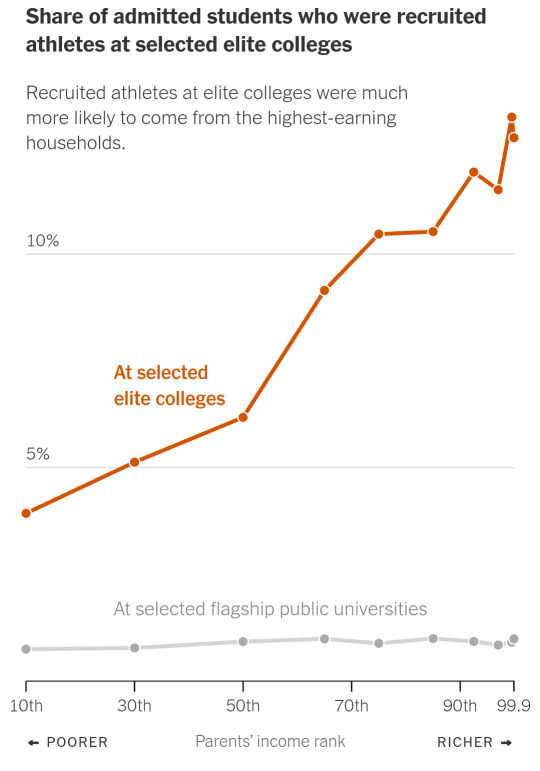
“There’s a common misperception that it’s about basketball and football and low-income kids making their way into selective colleges,” Professor Bastedo said. “But the enrollment leaders know athletes tend to be wealthier, so it’s a win-win.”
Nonacademic ratings
There was a third factor driving the preference for the richest applicants. The colleges in the study generally give applicants numerical scores for academic achievement and for more subjective nonacademic virtues, like extracurricular activities, volunteering and personality traits. Students from the top 1 percent with the same test scores did not have higher academic ratings. But they had significantly higher nonacademic ratings.

At one of the colleges that shared admissions data, students from the top 0.1 percent were 1.5 times as likely to have high nonacademic ratings as those from the middle class. The researchers said that, accounting for differences in the way each school assesses nonacademic credentials, they found similar patterns at the other colleges that shared data.
The biggest contributor was that admissions committees gave higher scores to students from private, nonreligious high schools. They were twice as likely to be admitted as similar students — those with the same SAT scores, race, gender and parental income — from public schools in high-income neighborhoods. A major factor was recommendations from guidance counselors and teachers at private high schools.
“Parents rattle off that a kid got in because he was first chair in the orchestra, ran track,” said John Morganelli Jr., a former director of admissions at Cornell and founder of Ivy League Admissions, where he advises high school students on applying to college. “They never say what really happens: Did the guidance counselor advocate on that kid’s behalf?”
Recommendation letters from private school counselors are notoriously flowery, he said, and the counselors call admissions officers about certain students.
“This is how the feeder schools get created,” he said. “Nobody’s calling on behalf of a middle- or lower-income student. Most of the public school counselors don’t even know these calls exist.”
The end of need-blind admissions?
Overall, the study suggests, if elite colleges had done away with the preferences for legacies, athletes and private school students, the children of the top 1 percent would have made up 10 percent of a class, down from 16 percent in the years of the study.
Legacy students, athletes and private school students do no better after college, in terms of earnings or reaching a top graduate school or firm, it found. In fact, they generally do somewhat worse.
The dean of admissions who spoke anonymously said change was easier said than done: “I would say there’s much more commitment to this than may be obvious. It’s just the solution is really complicated, and if we could have done it, we would have.”
For example, it’s not feasible to choose athletes from across the income spectrum if many college sports are played almost entirely by children from high-earning families. Legacies are perhaps the most complicated, the admissions dean said, because they tend to be highly qualified and their admission is important for maintaining strong ties with alumni.
Ending that preference, the person said, “is not an easy decision to make, given the alumni response, especially if you’re not in immediate concurrence with the rest of the Ivies.” (Though children of very large donors also get special consideration by admissions offices, they were not included in the analysis because there are relatively few of them.)
People involved in admissions say that achieving more economic diversity would be difficult without doing something else: ending need-blind admissions, the practice that prevents admissions officers from seeing families’ financial information so their ability to pay is not a factor. Some colleges are already doing what they call “need-affirmative admissions,” for the purpose of selecting more students from the low end of the income spectrum, though they often don’t publicly acknowledge it for fear of blowback.
There is a tool, Landscape from the College Board, to help determine if an applicant grew up in a neighborhood with significant privilege or adversity. But these colleges have no knowledge of parents’ income if students don’t apply for financial aid.
Ivy League colleges and their peers have recently made significant efforts to recruit more low-income students and subsidize tuition. Several now make attendance entirely free for families below a certain income — $100,000 at Stanford and Princeton, $85,000 at Harvard, and $60,000 at Brown.
At Princeton, one-fifth of students are now from low-income families, and one-fourth receive a full ride. It has recently reinstated a transfer program to recruit low-income and community college students. At Harvard, one-fourth of this fall’s freshman class is from families with incomes less than $85,000, who will pay nothing. The majority of freshmen will receive some amount of aid.
Dartmouth just raised $500 million to expand financial aid: “While we respect the work of Harvard’s Opportunity Insights, we believe our commitment to these investments and our admissions policies since 2015 tells an important story about the socioeconomic diversity among Dartmouth students,” said Jana Barnello, a spokeswoman.
Public flagships do admissions differently, in a way that ends up benefiting rich students less. The University of California schools forbid giving preference to legacies or donors, and some, like U.C.L.A., do not consider letters of recommendation. The application asks for family income, and colleges get detailed information about California high schools. Application readers are trained to consider students’ circumstances, like whether they worked to support their families in high school, as “evidence of maturity, determination and insight.”
The University of California system also partners with schools in the state, from pre-K through community college, to support students who face barriers. There’s a robust program for transfer students from California community colleges; at U.C.L.A., half are from low-income backgrounds.
M.I.T., which stands out among elite private schools as displaying almost no preference for rich students, has never given a preference to legacy applicants, said its dean of admissions, Stuart Schmill. It does recruit athletes, but they do not receive any preference or go through a separate admissions process (as much as it may frustrate coaches, he said).
“I think the most important thing here is talent is distributed equally but opportunity is not, and our admissions process is designed to account for the different opportunities students have based on their income,” he said. “It’s really incumbent upon our process to tease out the difference between talent and privilege.”
Source: Raj Chetty, David J. Deming and John N. Friedman, “Diversifying Society’s Leaders? The Determinants and Causal Effects of Admission to Highly Selective Private Colleges”
193 notes
·
View notes
Text
From the river to the sea
hey all! firstgrave here
I was somewhat recently banned on tumblr for “targeted harassment”. the post that got me banned? a post in which I said Israeli settlers and former IDF soldiers had actively engaged in ethnic cleansing and genocide.
I attempted to appeal the ban but have gotten nowhere, and I do see this as the final reason in why I should stay away from tumblr as a whole. I am no longer interested in coming back to tumblr, and will be making no future efforts to do so.
however, some important updates I want to give: many people whom I was mutuals with were there for my entire law school journey, the passing of the bar, and my entrance into the career of public defender. this is something I’ve been dreaming of and working towards for years now.
in october, the union which represents the office of public defenders I work with, and the majority of public defenders in NY entirely, proposed a resolution on the genocide in Palestine, reinforcing the rights of union members to speak out against apartheid and ethnic cleansing and calling for an end to Israeli occupation. in response, four Zionist members of the union have commenced a lawsuit in attempt to get an injunction against the union members voting on the resolution. the union has now filed a motion to move the case to federal court, thus removing it from the jurisdiction of conservative Long Island state court judges, but also to have the action deemed as an unconstitutional infringement on free speech.
since the lawsuit was filed, a supervisor at my office has cursed out myself and the 8 new attorneys I was hired with, telling us to “get the fuck” out of her office if we don’t support Israel, and we do not deserve to work there if we do not agree with her. so now we are also in the process of filing a union grievance and EOC claim against the supervisor. this has put us at significant odds against management and we may very well lose our jobs over this (we are at-will employees for the first 3 years of our contract, so while discriminatory firings are illegal, it would be near impossible to prove in this instance.) I am likely to lose my dream job that I have worked years to reach over this.
The attempts to silence any and all people who speak out against the atrocities being committed with our tax funding cannot be ignored. When we look back at the atrocities of history and wonder how they were allowed to occur, it is because many people feel more comfortable turning a blind eye to the suffering of those “other” to them, and those that do care are faced with coordinated censorship campaigns armed with threats of loss of employment, homelessness, incarceration, violence, and even death.
In the time all of this has occurred, thousands of men, women, and children have been senselessly and brutally massacred by Israeli forces, aided by other world powers. The US is actively and happily funding the genocide of Palestinians, as well as Britain, Canada, and other imperial nations. Babies have been abandoned and denied humanitarian aid, cities have been leveled, and families have been devastated.
Attached here is the proposed resolution of the legal aid union. I stand by it wholeheartedly, and ask others to share it as well. There is no excuse for silence or complacency in the face of genocide. Those who are not in Palestine, have not witnessed and experienced the horrors in which every Palestinian citizen has been forced to endure, do not get the benefit of turning a blind eye.
May we see a free Palestine in our lifetimes.



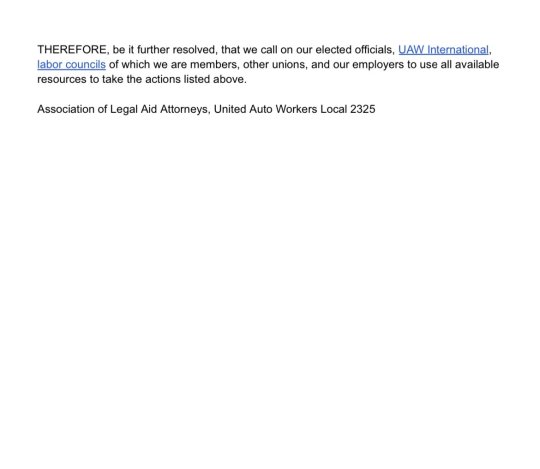
118 notes
·
View notes
Text
Capitalists hate capitalism

As the Marxist agitator Adam Smith once said, “People of the same trade seldom meet together, even for merriment and diversion, but the conversation ends in a conspiracy against the public, or in some contrivance to raise prices.”
Smith understood that capitalists hate capitalism. They don’t want to compete with one another, because that would interfere with their ability to raise the prices their customers pay and reduce the wages they pay their workers. Thus Peter Thiel’s anticapitalist rallying cry, “competition is for losers,” or Warren Buffett’s extreme horniness for businesses with “wide, sustainable moats.”
These anti-capitalist capitalists love big government. They love no-bid military contracts, they love ACA subsidies for health insurance companies, they love Farm Bill cash for Cargill and Monsanto. What they don’t love is markets.
Case in point: pharma giant Merck. The Inflation Reduction Act (IRA) includes a provision that allows Medicare to (finally) start (weakly) negotiating the prices it pays for (a tiny handful of) drugs. If you’re scratching your head and wondering if you understood that correctly, let me assure you, you did: the US government is currently prohibited from negotiating drug prices when it bargains with pharma companies.
In other words: Medicare simply pays a pharma companies — whose products build on billions in publicly funded basic research, whose taxes are reduced by billions in research credits, whose patents are backstopped by billions in enforcement — whatever it demands.
To do otherwise, you see, would be socialism. Markets are “efficient” because they “discover prices” through bidding and selling. In the case of publicly purchased drugs, the price that Uncle Sucker “discovers” is inevitably “a titanic sum” or possibly “add a couple more zeroes, wouldya?”
Enter the IRA. Starting in 2026, Medicare will be permitted to negotiate the price of ten (10) drugs. The negotiations will use the prices of other drugs from the dysfunctional, monopolized market as a starting point and go up from there. The negotiations go on for three years, and there are multiple stages where pharma companies can hit pause with court challenges:
https://prospect.org/health/2023-05-11-regulators-bungling-drug-price-reform/
The system will not consider the prices that Medicaid or the VA (which are allowed to bargain on prices) pay. Nor will it consider the prices that other governments pay — the US is alone in the wealthy world in offering the anticapitalist price-taking posture when dickering with the pharma companies.
But this isn’t enough for Merck. They are suing the Biden administration over the IRA’s drug pricing plan, arguing that it is an unconstitutional taking under the Fifth Amendment:
https://www.cnbc.com/2023/06/06/merck-sues-biden-administration-over-medicare-drug-price-negotiations.html
Merck is represented by Big Law firm Jones Day, who made their bones by representing the RJ Reynolds from smokers with lung-cancer, arguing that the smoking/cancer link wasn’t scientifically sound. That’s not the only fanciful argument they put before a judge: Jones Day also represented Trump in his attempts to overturn the 2020 election (they also hired Trump’s counsel Don McGahn as he exited the White House’s revolving door).
As Ryan Cooper writes for The American Prospect, Merck’s argument is that the “fair market” value of its drugs can only be discovered if its single largest customer — Medicare — simply pays whatever Merck demands of it:
https://prospect.org/health/2023-06-08-merck-negotiating-drug-prices-unconstitutional/
They explicitly denounce the idea that a powerful buyer should use its market power to extract price concessions from sellers like Merck: “leveraging all federal insurance benefits (amounting to over half of the prescription drug market) to coerce companies to abandon their First and Fifth Amendment rights is a quintessential unconstitutional condition.”
Rebutting this argument, Health Secretary Xavier Becerra said, “negotiating for the best price is as American as apple pie. Since when is competition in this American system a bad thing? Why should we be the patsies around the world and pay the highest prices for medicines?”
The irony here is that Merck itself is a very powerful buyer. Whether negotiating commercial leases, raw materials or wages, Merck is ruthless in extracting the lowest prices it can from its suppliers. The company attained its massive scale the old fashioned way: buying it. By drawing on its nearly limitless access to the capital markets, Merck bought out dozens of its competitors:
https://mergr.com/merck-acquisitions
Anticapitalist investors funded these acquisitions in the expectation that Merck would be able to use its market dominance to pay suppliers less, charge customers more, and use some of the resulting windfall to corrupt and bully its regulators so that it could buy still more companies, charge still higher prices, and impose crushingly low prices on still more suppliers.
The IRA’s drug-bargaining provisions are extraordinarily weak. When they were first mooted in 2021, I talked about how Democrats were caving on muscular drug price controls that would benefit every American (except a handful of pharma shareholders):
https://pluralistic.net/2021/11/18/bipartisan-consensus/#corruption
They did so despite wild, bipartisan support for imposing price discipline on Big Pharma, and ending the 300% premium Americans pay for their drugs relative to their cousins abroad. 95% of Democrats support strong price controls; so do 82% of independents — and 71% of Republicans:
https://www.rwjf.org/en/library/research/2021/11/healthcare-affordability--majority-of-adults-support-significant-changes-to-the-health-system.html
No one believes Big Pharma’s scare stories about how this would kill R&D: 93% of Americans reject this idea, including 90% of Republicans. They’re right — nearly all US basic pharma R&D is directly funded by the federal government, with pharma companies privatizing the gains:
https://khn.org/news/article/public-opinion-prescription-drug-prices-democratic-plan/
Despite the fact that really whipping the shit out of Big Pharma would be both popular and good for America, the Dems’ final version of pharma bargaining is a barely-there nothingburger where ten drugs will become slightly cheaper, after the next federal election. This is called “political realism” and it’s a fantasy.
The idea that limiting drug controls to the faintest, most modest measures would make them easier to attain was obvious nonsense from the start, and Merck’s anticapitalist lawsuit proves it. Merck will settle for nothing less than total central planning — by Merck. For Merck, the role of the federal government is to wave through a stream of mergers culminating in Merck’s ownership of every major drug; patent extensions for these drugs to carry them into the 25th century and beyond, and unlimited sums paid for these drugs on Medicare.
Given all that, there would have been no downside to the Dems passing an IRA that subjected the drug companies the same modest, commensense, market-based discipline we see in Canada, or the UK, or France, or Germany, or Switzerland.
But that’s not the IRA we got. Instead of defending a big, visionary program in court, the Biden admin is facing down Jones Day and Merck to defend the most yawn-inducing, incrementalist half-measure. What a wasted opportunity.

If you’d like an essay-formatted version of this post to read or share, here’s a link to it on pluralistic.net, my surveillance-free, ad-free, tracker-free blog:
https://pluralistic.net/2023/06/09/commissar-merck#price-giver

[Image ID: A caricature of a businessman with a money-bag for a head and a stickpin bearing the Merck logo, standing atop a pile of bundled $100 bills. At the bottom of the pile, a frowning, disheveled Uncle Sam offers up a $100 bill.]

Image:
Flying Logos (modified)
https://commons.wikimedia.org/wiki/File:Over_$1,000,000_dollars_in_USD_$100_bill_stacks.png
CC BY-SA 4.0
https://creativecommons.org/licenses/by-sa/4.0/deed.en
#pluralistic#merck#guillotine watch#big pharma#markets#anticapitalism#capitalism#pharma#whiners#bargaining power#price makers#price takers#uncle sucker#inflation reduction act#ira
223 notes
·
View notes
Note
Why do you hate state's rights and freedom?
i dunno what the context of this is, but,
1. state's rights to do what? no state, whether a federal state or a national government, should have the right to uphold, say, slavery or racial discrimination. insofar in a federal system that states have rights, those rights are subordinated to federal law. that's the point of having a federal government. a lot of the shit done in the name of "state's rights" is explicitly unconstitutional--stuff like the nullification crisis--and envisions states having rights that they have never had, at least not since the Constitution was adopted.
states aren't human beings, so any sort of "natural rights" defense of a broad interpretation of state's rights falls flat to me. if polities have rights it is only those rights which a) are explicitly granted by law (like the Constitution), and b) are a product of the principle of democratic self-determination. hard to make the case that either slavery or Jim Crow, the basis of the major states' rights causes celebre in American history, are the product of democratic self-determination! they explicitly rely on restricting civic participation from a big chunk of society!
2. big fan of freedom. but a lot of americans define freedom in a way that means "freedom to be at the top of the hierarchy (and thus to dominate others)," which strikes me as at best anachronistic, a holdover from the middle age notions of aristocratic freedom, and at worst tendentious. applying a principle like "freedom to determine the shape of your own life in a self-directed way" to maximize the availability of that freedom in your society sometimes requires shit like levying taxes to pay for a social safety net, since in practice it's hard to determine the shape of your life in a self-directed way if you are starving to death. and paying a percentage of your income to the government is not actually a big infringement on your freedom, especially if the government is a product of reasonably democratic self-determination, and especially if the government is providing things like roads, public order, water and power infrastructure, markets, enforcement of contracts, etc.
if you chafe under that system, you are (if American) always free to renounce your citizenship. don't think statelessness is all it's cracked up to be, though.
41 notes
·
View notes
Text
61 notes
·
View notes
Text
Let’s imagine for a minute that you’re Mace at the end of RotS.
You’ve just discovered that the Chancellor, your legally elected head of government who has been trusted with leading your civilization through this war, has actually been playing both sides the entire time and caused the war in the first place, all for his own personal gain. This war has devastated entire planets and peoples, taking millions of lives, including civilians and your own personal friends who were drafted into the war by the Chancellor in the first place. The Chancellor has overstayed his term by five years and amassed incredible and unconstitutional powers because of the war he created, and is quickly on his way to becoming a galactic dictator. To add insult to injury, you have good reason to believe that said Chancellor is even now organizing the genocide of the rest of your people. If you don’t stop him now, no one will be able to.
So, with the powers your people have been trusted with for centuries, you and several of your friends go to arrest him. He resists arrest, and reminds you that he has control over the Senate, so even if he is arrested, he won’t be punished for his actions. You continue to try to arrest him, but he refuses, attacking you and your friends, and killing all of them. He then tries to kill you. You manage to defeat him, but when you go to arrest him, he attacks again with lightning that comes from his hands. Even blocking it is incredibly difficult and taxing, and letting your guard down for an instant means certain death. He can use this attack at any time. If you attempt to handcuff him, you leave yourself open. If you try to cut his hands off, you leave yourself open. He has made it clear that if you do anything to let your guard down, he will kill you. Keep in mind that, even if you do find a way to non-lethally subdue him, you will then have to turn him over to the courts, which he has complete control over. If you kill him now, the threat will end and it will be obvious that you were acting in self-defense.
Remember that he is responsible for the deaths of millions, and that if he escapes he will kill thousands more and destroy your democracy.
#just to make it clear exactly what the stakes are and what’s happening in that scene#all the people who say mace should’ve arrested him kind of ignore how he could’ve done it in this situation#and what the cost of attempting it would’ve been#poll#Star Wars poll#rots#revenge of the sith#prequels#sw prequels#prequel trilogy#mace Windu#star wars#palpatine#sheev palpatine#chancellor palpatine#emperor palpatine#darth sidious
115 notes
·
View notes
Text

Indiana's $5.6m tax on tampons and feminine products causes 36% of Hoosier women to miss one day or more of work or school due to the cost of menstrual products. Indiana’s GOP refuses to eliminate this unconstitutional tax and sexualize tampons.
Indiana is among one of the 21 states nationally that still tax menstrual products. In the last legislative session, State Senator Shelli Yoder for Indiana's 40th District authored Senate Bill 259 which proposed removing taxes on menstrual products. The bill however never made it to a hearing.
62 notes
·
View notes
Text
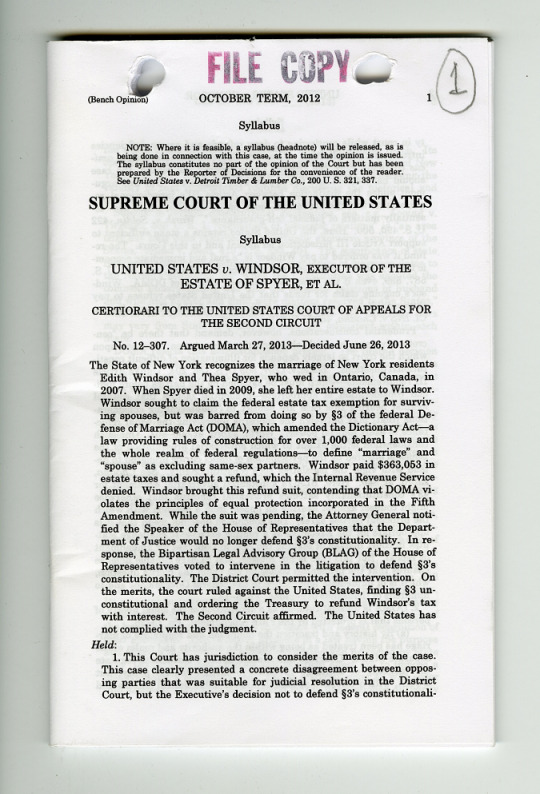
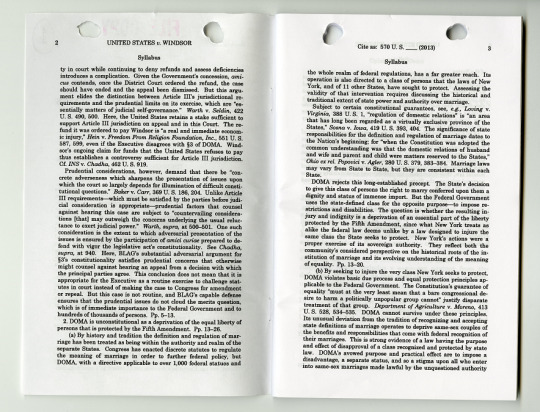
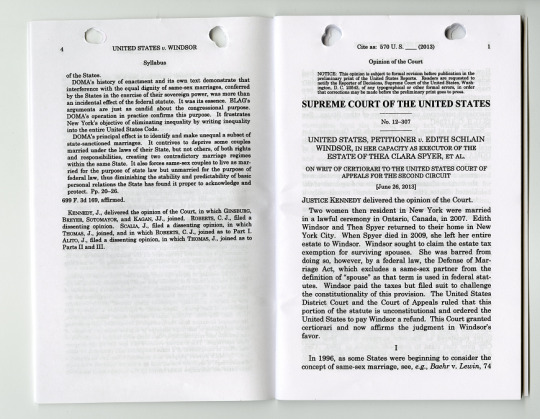
The Supreme Court ruled that the Defense of Marriage Act was unconstitutional on June 26, 2013.
In U.S. v Windsor, SCOTUS held that the federal government could not discriminate against same-sex couples.
Record Group 267: Records of the Supreme Court of the United States
Series: Appellate Jurisdiction Case Files
Transcription:
[Stamped: " FILE COPY "]
(Bench Opinion) OCTOBER TERM, 2012 1 [Handwritten and circled " 1" in upper right-hand corner]
Syllabus
NOTE: Where it is feasible, a syllabus (headnote) will be released, as is
being done in connection with this case, at the time the opinion is issued.
The syllabus constitutes no part of the opinion of the Court but has been
prepared by the Reporter of Decisions for the convenience of the reader.
See United States v. Detroit Timber & Lumber Co., 200 U.S. 321, 337.
SUPREME COURT OF THE UNITED STATES
Syllabus
UNITED STATES v. WINDSOR, EXECUTOR OF THE
ESTATE OF SPYER, ET AL.
CERTIORARI TO THE UNITED STATES COURT OF APPEALS FOR
THE SECOND CIRCUIT
No. 12-307. Argued March 27, 2013---Decided June 26, 2013
The State of New York recognizes the marriage of New York residents
Edith Windsor and Thea Spyer, who wed in Ontario, Canada, in
2007. When Spyer died in 2009, she left her entire estate to Windsor.
Windsor sought to claim the federal estate tax exemption for surviv-
ing spouses, but was barred from doing so by §3 of the federal Defense
of Marriage Act (DOMA), which amended the Dictionary Act---a
law providing rules of construction for over 1,000 federal laws and
the whole realm of federal regulations-to define "marriage" and
"spouse" as excluding same-sex partners. Windsor paid $363,053 in
estate taxes and sought a refund, which the Internal Revenue Service
denied. Windsor brought this refund suit, contending that DOMA vi-
olates the principles of equal protection incorporated in the Fifth
Amendment. While the suit was pending, the Attorney General notified
the Speaker of the House of Representatives that the Department
of Justice would no longer defend §3's constitutionality. In re-
sponse, the Bipartisan Legal Advisory Group (BLAG) of the House of
Representatives voted to intervene in the litigation to defend §3's
constitutionality. The District Court permitted the intervention. On
the merits, the court ruled against the United States, finding §3 un-
constitutional and ordering the Treasury to refund Windsor's tax
with interest. The Second Circuit affirmed. The United States has
not complied with the judgment.
Held:
1. This Court has jurisdiction to consider the merits of the case.
This case clearly presented a concrete disagreement between oppos-
ing parties that was suitable for judicial resolution in the District
Court, but the Executive's decision not to defend §3's constitutionali-
[page 2]
2 UNITED STATES v. WINDSOR
Syllabus
ty in court while continuing to deny refunds and assess deficiencies
introduces a complication. Given the Government's concession, ami-
cus contends, once the District Court ordered the refund, the case
should have ended and the appeal been dismissed. But this argu-
ment elides the distinction between Article Ill's jurisdictional re-
quirements and the prudential limits on its exercise, which are "es-
sentially matters of judicial self-governance." Warth v. Seldin, 422
U. S. 490, 500. Here, the United States retains a stake sufficient to
support Article III jurisdiction on appeal and in this Court. The re-
fund it was ordered to pay Windsor is "a real and immediate econom-
ic injury," Hein v. Freedom From Religion Foundation, Inc., 551 U. S.
587, 599, even if the Executive disagrees with §3 of DOMA. Wind-
sor's ongoing claim for funds that the United States refuses to pay
thus establishes a controversy sufficient for Article III jurisdiction.
Cf. INS v. Chadha, 462 U. S. 919.
Prudential considerations, however, demand that there be "con-
crete adverseness which sharpens the presentation of issues upon
which the court so largely depends for illumination of difficult consti-
tutional questions." Baker v. Carr, 369 U. S. 186, 204. Unlike Article
III requirements---which must be satisfied by the parties before judi-
cial consideration is appropriate---prudential factors that counsel
against hearing this case are subject to "countervailing considera-
tions [that] may outweigh the concerns underlying the usual reluc-
tance to exert judicial power." Warth, supra, at 500-501. One such
consideration is the extent to which adversarial presentation of the
issues is ensured by the participation of amici curiae prepared to de-
fend with vigor the legislative act's constitutionality. See Chadha,
supra, at 940. Here, BLAG's substantial adversarial argument for
§3's constitutionality satisfies prudential concerns that otherwise
might counsel against hearing an appeal from a decision with which
the principal parties agree. This conclusion does not mean that it is
appropriate for the Executive as a routine exercise to challenge stat-
utes in court instead of making the case to Congress for amendment
or repeal. But this case is not routine, and BLAG's capable defense
ensures that the prudential issues do not cloud the merits question,
which is of immediate importance to the Federal Government and to
hundreds of thousands of persons. Pp. 5-13.
2. DOMA is unconstitutional as a deprivation of the equal liberty of
persons that is protected by the Fifth Amendment. Pp. 13--26.
(a) By history and tradition the definition and regulation of mar-
riage has been treated as being within the authority and realm of the
separate States. Congress has enacted discrete statutes to regulate
the meaning of marriage in order to further federal policy, but
DOMA, with a directive applicable to over 1,000 federal statues and
[NEW PAGE]
Cite as: 570 U.S._ (2013) 3
Syllabus
the whole realm of federal regulations, has a far greater reach. Its
operation is also directed to a class of persons that the laws of New
York, and of 11 other States, have sought to protect. Assessing the
validity of that intervention requires discussing the historical and
traditional extent of state power and authority over marriage.
Subject to certain constitutional guarantees, see, e.g., Loving v.
Virginia, 388 U.S. 1, "regulation of domestic relations" is "an area
that has long been regarded as a virtually exclusive province of the
States," Sosna v. Iowa, 419 U. S. 393, 404. The significance of state
responsibilities for the definition and regulation of marriage dates to
the Nation's beginning; for "when the Constitution was adopted the
common understanding was that the domestic relations of husband
and wife and parent and child were matters reserved to the States,"
Ohio ex rel. Popovici v. Agler, 280 U. S. 379, 383-384. Marriage laws
may vary from State to State, but they are consistent within each
State.
DOMA rejects this long-established precept. The State's decision
to give this class of persons the right to marry conferred upon them a
dignity and status of immense import. But the Federal Government
uses the state-defined class for the opposite purpose---to impose re-
strictions and disabilities. The question is whether the resulting injury
and indignity is a deprivation of an essential part of the liberty
protected by the Fifth Amendment, since what New York treats as
alike the federal law deems unlike by a law designed to injure the
same class the State seeks to protect. New York's actions were a
proper exercise of its sovereign authority. They reflect both the
community's considered perspective on the historical roots of the in-
stitution of marriage and its evolving understanding of the meaning
of equality. Pp. 13--20.
(b) By seeking to injure the very class New York seeks to protect,
DOMA violates basic due process and equal protection principles ap-
plicable to the Federal Government. The Constitution's guarantee of
equality "must at the very least mean that a bare congressional de-
sire to harm a politically unpopular group cannot" justify disparate
treatment of that group. Department of Agriculture v. Moreno, 413
U. S. 528, 534-535. DOMA cannot survive under these principles.
Its unusual deviation from the tradition of recognizing and accepting
state definitions of marriage operates to deprive same-sex couples of
the benefits and responsibilities that come with federal recognition of
their marriages. This is strong evidence of a law having the purpose
and effect of disapproval of a class recognized and protected by state
law. DOMA's avowed purpose and practical effect are to impose a
disadvantage, a separate status, and so a stigma upon all who enter
into same-sex marriages made lawful by the unquestioned authority
[page 3]
4 UNITED STATES v. WINDSOR
Syllabus
of the States.
DOMA's history of enactment and its own text demonstrate that
interference with the equal dignity of same-sex marriages, conferred
by the States in the exercise of their sovereign power, was more than
an incidental effect of the federal statute. It was its essence. BLAG's
arguments are just as candid about the congressional purpose.
DOMA's operation in practice confirms this purpose. It frustrates
New York's objective of eliminating inequality by writing inequality
into the entire United States Code.
DOMA's principal effect is to identify and make unequal a subset of
state-sanctioned marriages. It contrives to deprive some couples
married under the laws of their State, but not others, of both rights
and responsibilities, creating two contradictory marriage regimes
within the same State. It also forces same-sex couples to live as mar-
ried for the purpose of state law but unmarried for the purpose of
federal law, thus diminishing the stability and predictability of basic
personal relations the State has found it proper to acknowledge and
protect. Pp. 20-26.
699 F. 3d 169, affirmed.
KENNEDY, J., delivered the opinion of the Court, in which GINSBURG,
BREYER, SOTOMAYOR, and KAGAN, JJ., joined. ROBERTS, C. J., filed a
dissenting opinion. SCALIA, J., filed a dissenting opinion, in which
THOMAS, J., joined, and in which ROBERTS, C. J., joined as to Part I.
ALITO, J., filed a dissenting opinion, in which THOMAS, J., joined as to
Parts II and III.
[NEW PAGE]
Cite as: 570 U. S. _ (2013) 1
Opinion of the Court
NOTICE: This opinion is subject to formal revision before publication in the
preliminary print of the United States Reports. Readers are requested to
notify the Reporter of Decisions, Supreme Court of the United States, Washington,
D. C. 20543, of any typographical or other formal errors, in order
that corrections may be made before the preliminary print goes to press.
SUPREME COURT OF THE UNITED STATES
No. 12-307
UNITED STATES, PETITIONER v. EDITH SCHLAIN
WINDSOR, IN HER CAPACITY AS EXECUTOR OF THE
ESTATE OF THEA CLARA SPYER, ET AL.
ON WRIT OF CERTIORARI TO THE UNITED STATES COURT OF
APPEALS FOR THE SECOND CIRCUIT
[June 26, 2013]
JUSTICE KENNEDY delivered the opinion of the Court.
Two women then resident in New York were married
in a lawful ceremony in Ontario, Canada, in 2007. Edith
Windsor and Thea Spyer returned to their home in New
York City. When Spyer died in 2009, she left her entire
estate to Windsor. Windsor sought to claim the estate tax
exemption for surviving spouses. She was barred from
doing so, however, by a federal law, the Defense of Mar-
riage Act, which excludes a same-sex partner from the
definition of "spouse" as that term is used in federal stat-
utes. Windsor paid the taxes but filed suit to challenge
the constitutionality of this provision. The United States
District Court and the Court of Appeals ruled that this
portion of the statute is unconstitutional and ordered the
United States to pay Windsor a refund. This Court granted
certiorari and now affirms the judgment in Windsor's
favor.
I
In 1996, as some States were beginning to consider the
concept of same-sex marriage, see, e.g., Baehr v. Lewin, 74
#archivesgov#June 26#2013#2010s#Pride#LGBTQ+#LGBTQ+ history#U.S. v Windsor#Defense of Marriage Act#same-sex marriage#Supreme Court#SCOTUS
143 notes
·
View notes
Text

This Day in History: Charleston Tea Party
On this day in 1774, the South Carolina Gazette reports on the so-called Charleston Tea Party. You’ve heard of the Boston Tea Party, of course. Charleston had one, too!
Colonists were upset about Parliament’s “unconstitutional tax” on tea in those days, as you may know. You can imagine, then, that those in Charleston were furious when a ship loaded with 257 chests of tea arrived in their harbor in November 1773.
Something had to be done, and a meeting was convened. Patriots such as Christopher Gadsden and Charles Pinckney convinced merchants to sign an agreement: They would not import any more of the much-hated tea.
The story continues here: http://www.taraross.com/post/tdih-charleston-tea-party
47 notes
·
View notes
Text
Anyway. Hey so Amazon has joined with Space X/Twitter and Trader Joe's saying that the National Labor Relations Board (NLRB) is unconstitutional because it enforces that employers recognize unions
The NLRB was put in place by FDR and has been law for 88 years. Corpos are getting big mad at the wave of unions forming because they've been treating their employees like dogshit for years
I cannot stress enough how much I hate capitalism and how billionaires should NEVER been allowed to be a thing and we should he taxing their asses because they are now using their ill-gotten wealth to buy their way past laws
I wish CEO's and billionaires a very "Hope you like mobs storming your mansions"

21 notes
·
View notes